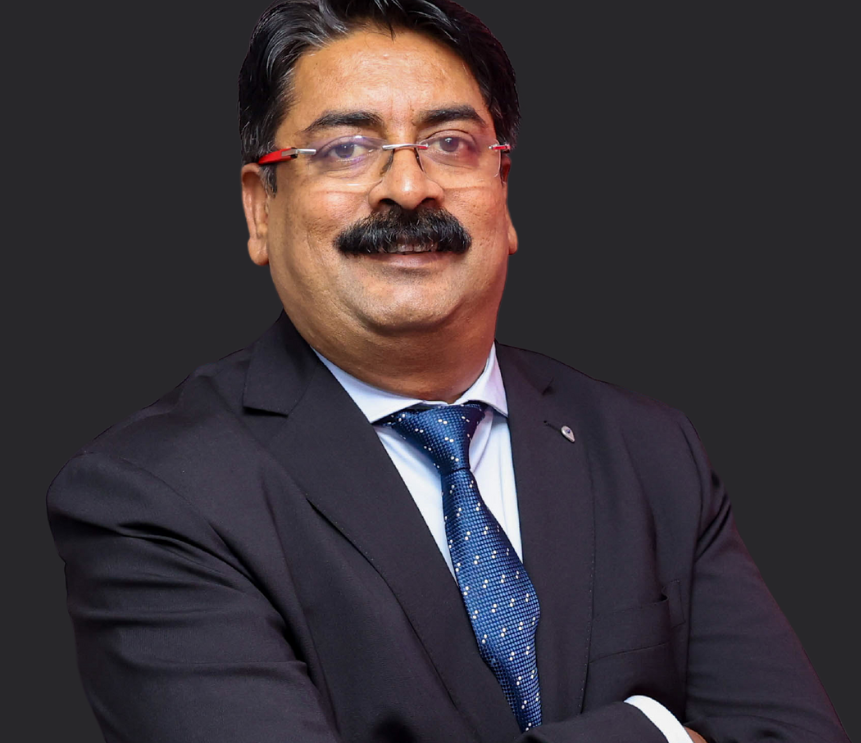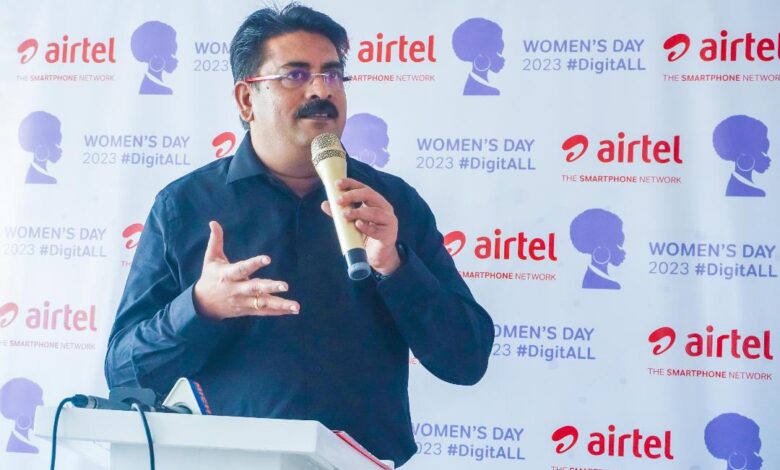Technology
Navigating the Path to Sustainable Telecom Services for Subscribers

By Dinesh Balsingh
As Nigeria continues its journey towards becoming a digitally driven economy, reliable telecommunications services remain the backbone of our collective progress. At Airtel Nigeria, we are committed to delivering world-class connectivity to millions of Nigerians, enabling economic growth, empowering businesses, and enhancing lives.
We understand that the future technology needs of the country, as ushered in by the highspeed 5G era of AI, Cloud computing, Data science applications, and Blockchain, should be directing significant investments towards building a resilient network. However, the industry faces significant challenges that require a closer look as we strive to maintain the high standards that our customers deserve.
Increased Intensity of Investments: The increasing demand for digital services across sectors such as education, media, banking, transportation, and manufacturing has come with an increased demand for telecom capacity.
Upgrading networks to deliver more data capacity is key to a sustainable future. To help ensure that the Nigerian economy keeps pace with the global improvements in technology and communications while supporting the aspirations of consumers, we also take on the responsibility of executing new technology and system upgrades as well as improved security. Data security is now more than ever a priority as more and more people upload personal information online.
All of these require significant investments which are sourced from the international markets at costs denominated in US Dollars. In the past three to four years, for instance, the dollar has gone from exchanging for about N500 to over N1,600. This more than three-fold increase in foreign exchange conversion exponentially increases the cost of investments required to run a good quality network.
In addition to this unprecedented hike in capital expenditure, the operating costs have surged dramatically, with operating expenses rising by over 300% in the last 18 to 24 months alone.
While several critical areas of the business are impacted, I would, for expediency, focus on three of those areas: Rising Energy Costs, Infrastructure Challenges, and a Commitment to Quality Service.
Rising Energy Costs: Powering telecommunication infrastructure requires significant energy resources. Energy is the single largest operating cost for running a network. With increasing global energy prices and while efforts are ongoing to fully stabilize the power supply in Nigeria, Airtel Nigeria and other operators in the sector are incurring soaring costs to keep networks running seamlessly.
Infrastructure Challenges: The industry continues to grapple with rampant fibre cuts and vandalization of critical infrastructure. These incidents not only disrupt services but also demand substantial investments to repair and maintain facilities.
Commitment to Quality Service: Despite these challenges, Airtel Nigeria has remained steadfast in ensuring quality of service. From expanding 4G and 5G networks to meeting growing demand in urban and rural areas, we have painstakingly absorbed the rising costs of these obligations to avoid compromising the customer experience and ensuring Nigerians, regardless of their location, have access to mobile communication and remain connected to the digital economy.
Telecommunications operators have worked tirelessly to sustain services despite keeping tariffs unchanged for the last 10 years. While tariffs have remained static for over a decade, the economic realities necessitate a review to ensure the sustainability of services hence our recent application to the government for tariff adjustment which if approved will be a step towards addressing this imbalance. It is not a decision taken lightly but one borne out of the need to guarantee continued investment in network expansion, technology upgrades, and improved service delivery.
The telecommunications sector is pivotal to Nigeria’s ambition to become a digital economy leader in Africa. Meeting this aspiration requires operators to make substantial investments in network infrastructure, spectrum acquisition, and innovative solutions. These investments come at a cost, one that must be shared proportionally to ensure long-term viability.
At Airtel Nigeria, we remain resolute in our commitment to:
Delivering Quality Services: The government continues to monitor operators’ compliance with service quality standards. Airtel is dedicated to surpassing these benchmarks, ensuring customers experience uninterrupted and superior connectivity.
Driving Economic Growth: By expanding our network and enhancing digital inclusivity, we are enabling the government’s economic turnaround agenda and fostering opportunities for all Nigerians.
Being a Reliable Partner: Despite industry challenges, we are steadfast in our role as a trusted partner in Nigeria’s digital transformation journey.
While significant tariff adjustments have become warranted for the sustainability of the industry, Airtel has always been sensitive to affordability and understands that the price adjustments must be done gradually to support our customers’ financial positions. We believe that approval of revised tariffs will empower operators to invest in capacity, expand coverage to underserved areas, aim for advanced security on the networks, and improve service quality and network availability while ensuring that Nigeria remains competitive in the global digital landscape.
As we navigate the present imperatives together, we urge all stakeholders, including customers, regulators, and partners to recognize the importance of building a resilient telecommunications ecosystem. Airtel Nigeria remains committed to delivering unmatched value while supporting the nation’s economic development.
Dinesh Balsingh is the Managing Director/CEO of Airtel Nigeria
Technology
Leticia Otomewo Becomes Secure Electronic Technology’s Acting Secretary

By Aduragbemi Omiyale
One of the players in the Nigerian gaming industry, Secure Electronic Technology (SET) Plc, has appointed Ms Leticia Otomewo as its acting secretary.
This followed the expiration of the company’s service contract with the former occupier of the seat, Ms Irene Attoe, on January 31, 2026.
A statement to the Nigerian Exchange (NGX) Limited on Thursday said Ms Otomewo would remain the organisation’s scribe in an acting capacity, pending the ratification and appointment of a substantive company secretary at the next board meeting.
She was described in the notice signed by the Managing Director of the firm, Mr Oyeyemi Olusoji, as “a results-driven executive with 22 years of experience in driving business growth, leading high-performing teams, and delivering innovative solutions.”
The acting secretary is also said to be “a collaborative leader with a passion for mentoring and developing talent.”
“The company assures the investing public that all Company Secretariat responsibilities and regulatory obligations will continue to be discharged in full compliance with the Companies and Allied Matters Act, applicable regulations, and the Nigerian Exchange Limited Listing Rules,” the disclosure assured.
Meanwhile, the board thanked Ms Attoe “for professionalism and contributions to the Company during the period of her engagement and wishes her well in her future endeavours.”
Technology
Russia Blocks WhatsApp Messaging Service

By Adedapo Adesanya
The Russian government on Thursday confirmed it has blocked the WhatsApp messaging service, as it moves to further control information flow in the country.
It urged Russians to use a new state-backed platform called Max instead of the Meta-owned service.
WhatsApp issued a statement earlier saying Russia had attempted to “fully block” its messaging service in the country to force people toward Max, which it described as a “surveillance app.”
“Today the Russian government attempted to fully block WhatsApp in an effort to drive people to a state-owned surveillance app,” WhatsApp posted on social media platform X.
“Trying to isolate over 100 million users from private and secure communication is a backwards step and can only lead to less safety for people in Russia,” it said, adding: “We continue to do everything we can to keep users connected.”
Russia’s latest move against social media platforms and messaging services like WhatsApp, Signal and Telegram comes amid a wider attempt to drive users toward domestic and more easily controlled and monitored services, such as Max.
Russia’s telecoms watchdog, Roskomnadzor, has accused messaging apps Telegram and WhatsApp of failing to comply with Russian legislation requiring companies to store Russian users’ data inside the country, and of failing to introduce measures to stop their platforms from being used for allegedly criminal or terrorist purposes.
It has used this as a basis for slowing down or blocking their operations, with restrictions coming into force since last year.
For Telegram, it may be next, but so far the Russian government has been admittedly slowing down its operations “due to the fact that the company isn’t complying with the requirements of Russian legislation.”
The chat service, founded by Russian developers but headquartered in Dubai, has been a principal target for Roskomnadzor’s scrutiny and increasing restrictions, with users reporting sluggish performance on the app since January.
Technology
Nigerian AI Startup Decide Ranks Fourth Globally for Spreadsheet Accuracy

By Adedapo Adesanya
Nigerian startup, Decide, has emerged as the fourth most accurate Artificial Intelligence (AI) agent for spreadsheet tasks globally, according to results from SpreadsheetBench, a widely referenced benchmark for evaluating AI performance on real-world spreadsheet problems.
According to the founder, Mr Abiodun Adetona, the ranking places Decide alongside well-funded global AI startups, including Microsoft, OpenAI, and Anthropic.
Mr Adetona, an ex-Flutterwave developer, also revealed that Decide now has over 3,000 users, including some who are paying customers, a signal to the ability of the startup to scale in the near future.
SpreadsheetBench is a comprehensive evaluation framework designed to push Large Language Models (LLMs) to their limits in understanding and manipulating spreadsheet data. While many benchmarks focus on simple table QA, SpreadsheetBench treats a spreadsheet as a complex ecosystem involving spatial layouts, formulas, and multi-step reasoning. So far, only three agents rank higher than Decide, namely Nobie Agent, Shortcut.ai, and Qingqiu Agent.
Mr Adetona said SpreadsheetBench measures how well AI agents can handle practical spreadsheet tasks such as writing formulas, cleaning messy data, working across multiple sheets, and reasoning through complex Excel workflows. Decide recorded an 82.5% accuracy score, solving 330 out of 400 verified tasks.
“The result reflects sustained investment in applied research, product iteration, and learning from real-world spreadsheet workloads across a wide range of use cases,” Mr Adetona told Business Post.
For Mr Adetona, who built Decide out of frustration with how much time professionals spend manually cleaning data, debugging formulas, and moving between sheets, “This milestone highlights how focused engineering and domain-specific AI development can deliver frontier-level performance outside of large research organisations. By concentrating on practical business data problems and building systems grounded in real user environments, we believe smaller teams can contribute meaningfully to advancing applied AI.”
“For Decide, this is a foundation for continued progress in intelligent spreadsheet and analytics automation,” he added.
-

 Feature/OPED6 years ago
Feature/OPED6 years agoDavos was Different this year
-
Travel/Tourism10 years ago
Lagos Seals Western Lodge Hotel In Ikorodu
-

 Showbiz3 years ago
Showbiz3 years agoEstranged Lover Releases Videos of Empress Njamah Bathing
-

 Banking8 years ago
Banking8 years agoSort Codes of GTBank Branches in Nigeria
-

 Economy3 years ago
Economy3 years agoSubsidy Removal: CNG at N130 Per Litre Cheaper Than Petrol—IPMAN
-

 Banking3 years ago
Banking3 years agoSort Codes of UBA Branches in Nigeria
-

 Banking3 years ago
Banking3 years agoFirst Bank Announces Planned Downtime
-

 Sports3 years ago
Sports3 years agoHighest Paid Nigerian Footballer – How Much Do Nigerian Footballers Earn



















